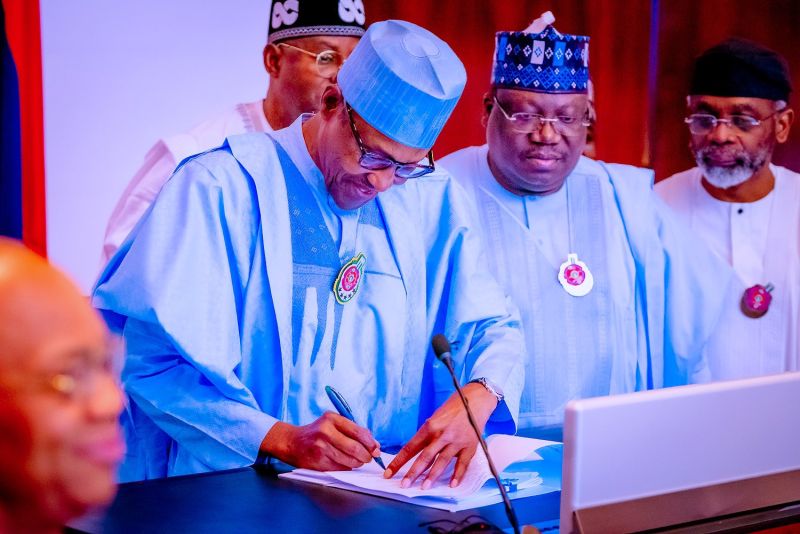The President, Major General Muhammadu Buhari (ret. ), has broken multiple campaign pledges in his eight years in office, leaving Nigerians with many unmet expectations.

The President, Major General Muhammadu Buhari (ret. ), has broken multiple campaign pledges in his eight years in office, leaving Nigerians with many unmet expectations.
Major General Muhammadu (ret.) took the oath of office on May 29, 2015, in front of thousands of Nigerians gathered in Eagles Square in Abuja and millions more watching on television.
President Muhammadu Buhari (retd.) has broken numerous campaign promises in his eight years in office. This has left Nigerians with many unfulfilled expectations stated during his campaign promises in 2014 and 2018.
On May 29, 2015, thousands of Nigerians gathered in Eagles Square in Abuja, while millions more watched on television to see the inauguration of their new President, Major General Muhammadu (retd.).
"Mai gaskiya! (meaning Man of Truth) Sai Baba! Sai Buhari!" supporters screamed. The widespread celebration and excitement demonstrated Nigerians' confidence and trust in the 72-year-old, tall, slim former Head of State from Daura, Northwest Nigeria.

After three unsuccessful attempts to run for president, Buhari leaves behind a failing economy, a very divisive state, and the war to free large areas of ungoverned territory from Boko Haram's control.
The terrorists did not just take lands. Many 276 schoolgirls kidnapped from Chibok a few years prior were still held captive. Buhari pledged to free them.
He was a calm leader ready to root out pervasive corruption, end the Boko Haram insurgency, reestablish security, and revitalize Africa's most significant economy on the day of his inauguration.
Read Also: NYSC Disowns Fraudulent Ex-Copper, Cautions Against Uniform Abuse
These demands weren't random or imposed on him. They were simply a result of his promises, which he stated were made in response to the residents' complaints over 16 years of poor leadership by the People's Democratic Party. He promised them opportunity, reform, and optimism.
Buhari made a promise to:
- Return Nigeria to a position of internment
- He promised to secure the country and efficiently manage the economy
- To govern Nigeria honestly under the constitution
- Attack poverty by shared economic growth
- Fight corruption through the impartial application of the law
- Tolerate no regional, religious, economic, or gender bias in government
This is after becoming the APC's presidential candidate on that Thursday night, December 11, 2014. Nigeria's GDP shrank 1.5% and entered a recession in the second quarter of 2016 for the first time in 25 years. The National Bureau of Statistics states that the steep decline was caused by a lack of hard money and falling oil earnings.
It further states that the contraction reflects a challenging year for Nigeria.
This includes:
- Weaker inflation-induced consumption demand
- An increase in pipeline vandalism
- Significantly reduced foreign reserves
- A concomitantly weaker currency.
The mainstay of Nigeria's economy, oil production, plummeted to 1.833 million barrels per day in the preceding months from 2.13 million bpd in 2015 as militant attacks in the oil-rich Niger Delta increased sharply.
Despite the government's resilience, the country entered its second recession in just five years in 2020. The World Bank announced in November 2022 that since Buhari's election as president in 2015, Nigeria's development had not advanced.
"Nigeria's development progress has stalled since 2015," it stated. Nevertheless, Nigeria was a rising star in West Africa's economic development, with an average annual growth rate of 7% and a ranking in the top 15 fastest-growing economies worldwide between 2001 and 2014.
The declining oil prices, greater insecurity, reversal of macroeconomic reforms, increased unpredictability of economic policies, and, most recently, the negative consequences of the COVID-19 pandemic are all reasons why the rising tide has stopped since 2015.
"As a result, from 2015 and 2021, growth decreased to an average of 1.1 percent. The population growth rate was among the highest in the area at 2.6 percent per year. The difference between Nigeria's and its peers' real GDP per capita increased with the slow economic growth.
In defense of itself, the dictatorship claims it has made "strides in infrastructural development during the past eight years. This includes roads, bridges, rail, air and seaports, housing, etc."
These efforts to expand infrastructure, however, are heavily reliant on borrowing from other nations. While Chinese loans to Nigeria have been a significant source of funding for the rails, more than N600 billion in Sukuk bonds have been raised since 2017 for more than 40 road projects across all six geopolitical zones.

